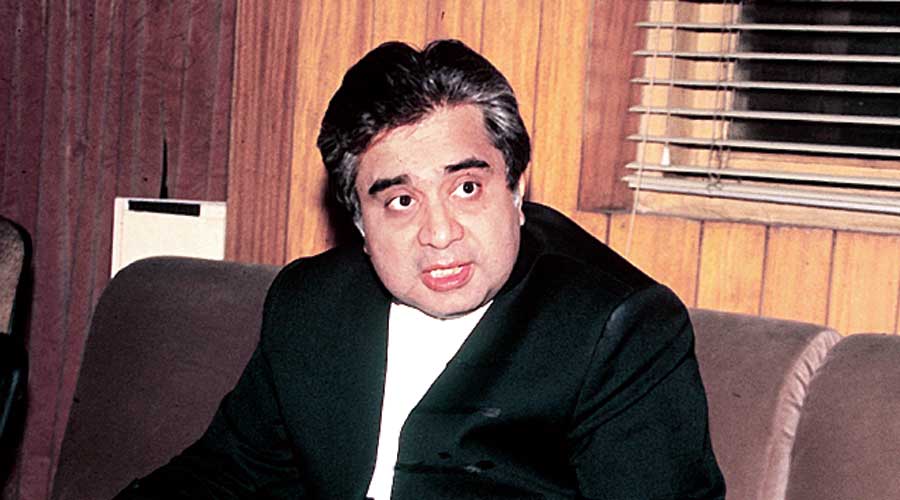Reliance Jio on Monday intervened in the legal battle over the payment of spectrum dues of over Rs 1.47 lakh crore that 15 entities, including its biggest rivals Bharti Airtel and Vodafone Idea, owe the government.
The development arose after a Supreme Court bench turned its attention last week to the Rs 40,000-crore dues that have to be extracted from entities like Reliance Communications (R-Com) that have burrowed themselves into a bankruptcy resolution process and sought protection from the claims on that account.
On Monday, Harish Salve, who had appeared on behalf of the creditor institutions of R-Com last Friday, chose to appear for Jio.
“I am appearing for Jio today,” Salve told the court, which expressed no surprise. “Oh! You are appearing for Jio today. All right!” said Justice Arun Mishra, who has been hearing the case with Justices Abdul Nazeer and M.R. Shah.
Salve has emerged as a legal man for all seasons, representing the Narendra Modi government in battles at the International Court of Justice at The Hague in the past.
Last Friday, the bench had wondered aloud whether Reliance Jio, which had acquired R-Com’s assets under a spectrum-sharing arrangement in 2016, could be directed to pay the Rs 25,000 crore that the insolvent telecom player owes the department of telecom (DoT). Jio is owned by Mukesh Ambani while R-Com belongs to his brother Anil Ambani.
Over the weekend, Jio sources had said no legal liability for the AGR dues of R-Com could be attached to the telecom behemoth -- a point Salve forcefully made in court on Monday.
Salve contended that the DoT had raised no claims against Jio. He added that Jio was not a party to the case but had appeared only to assist the Supreme Court in deciding the question of the competing priorities of the claims before the national company law tribunal (NCLAT) in the R-Com case.
In response to a query from the bench headed by Justice Mishra, Salve clarified that he was appearing for Jio but assured the court that he would hold consultations with the chairman of the State Bank of India -- which heads R-Com’s committee of creditors in the resolution process under the Insolvency and Bankruptcy Code (IBC) -- and resolve the conflict of opinion between the bankers and the DoT on the contentious issue of extracting AGR dues from entities embroiled in the IBC process.
Last October, the apex court had ordered the telecom companies to pay the dues immediately and bristled when the DoT and the telecom players continued to quibble over the exact sum that had to be paid. Last month, the court turned down any review of the Rs 1.47 lakh crore that had been computed by the DoT when making its claims.
Spectrum sharing
The apex court directed the DoT to place its views on the validity of the spectrum-sharing agreement between R-Com and Reliance Jio after the government asserted the radio waves were national property.
Appearing for the DoT, solicitor-general Tushar Mehta said: “Sharing of spectrum is different from spectrum trading. The view of DoT differs from views of the ministry of corporate affairs on the sale of spectrum under the IBC process.”
Endorsing the DoT’s view, Mehta added: “The people of the country are the owners of spectrum, which is held by the government in trust; it can’t be sold under the IBC.”
The DoT has consistently maintained that spectrum is farmed out to telecom entities on a 20-year contractual lease and cannot be sold or transferred without the government’s consent.
“We issued a notice in March 2019 to R-Com to show cause why spectrum should not be revoked due to the non-payment of dues,” Mehta told the court.
“Spectrum can never be the subject matter of IBC; it is the consistent position of DoT… Ministry of corporate affairs had sought to allow spectrum sale for maximisation of value.”
Competing claims
The issue has become complicated after Salve argued last week on behalf of the committee of creditors that the IBC resolution process gives primacy to the claims of financial creditors -- which means the DoT needs to stand in line with other operational creditors including unsecured creditors and other vendors. If that position is accepted by the court, the DoT will stand to get virtually nothing.
The court later adjourned the matter till Wednesday.











